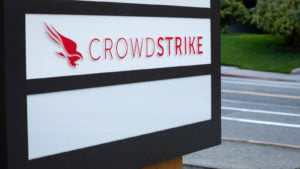After “crushing it” over the past year, what’s next for telework stocks? The move to working remotely may have enabled us to minimize the spread of the novel coronavirus. Still, even as the vaccine rollout is in full swing and we look to fully enter “recovery mode,” this trend shows few signs of slowing down.
Why? While the pandemic is lasting longer than expected, remote work has been a growing trend for years. However, large corporations, fearful of its impact on productivity, were cautious about signing off on it.
Now, after seeing the results, businesses are embracing this wide-scale change to how work gets done. In turn, this may mean further record growth ahead for the companies whose infrastructure/software solutions make telework possible.
To be sure, this trend has been heavily priced into the major plays in this space. We may see a pullback/correction in some names, as investors reassess the level of growth they’ll experience post-Covid. Yet as remote work is looking to be a permanent shift, leading names in this space could continue to see above-average rates of growth.
So, which telework stocks stand to gain in the years ahead? Keep these seven at the top of your watch list as this pandemic near-term fix morphs into a long-term trend:
- Adobe (NASDAQ:ADBE)
- CrowdStrike Holdings (NASDAQ:CRWD)
- Dropbox (NASDAQ:DBX)
- DocuSign (NASDAQ:DOCU)
- Microsoft (NASDAQ:MSFT)
- Smartsheet (NYSE:SMAR)
- Atlassian Corporation (NASDAQ:TEAM)
Telework Stocks: Adobe (ADBE)

It’s an understatement to say Adobe stock has greatly benefited from the rapid shift to remote work. Its Creative Cloud applications (Acrobat, Illustrator, PhotoShop) and Document Cloud (PDF, Adobe Sign), are part-and-parcel to office life.
Due to its pandemic-driven telework tailwinds, Adobe saw massive boost to its bottom line. For the fiscal year ending November 2020, earnings came in at $10.94 per share. That’s a more than 80% increase from the prior fiscal year.
Due to its stronger than expected results, the share price of ADBE stock has soared since the March 2020 “coronavirus crash.” After hitting prices as low as $284 per share, investors bid up this “stay-at-home-economy” plays to prices topping $533.80.
Further gains from here may be more muted. Yet, there’s reason to consider shares a buy, after its pullback from September to around $485 per share. Between the company’s $15 billion stock repurchase plan and the shift to remote work remaining a permanent trend, there’s plenty in play to move the needle for ADBE stock.
CrowdStrike Holdings (CRWD)

The move to large-scale telework has boosted demand for cloud computing and cloud-based software platforms. But, where demand has really skyrocketed is with cybersecurity solutions. This makes sense, given the potential network security risks of a remote work environment. Because of these concerns, businesses have turned to companies like CrowdStrike to keep their networks safe.
Sales for this cloud-based endpoint security services provider increased 78.6% year-over-year due to the rising need for telework cybersecurity. Growth in the coming year won’t be nearly as high. However, 41.2% projected sales growth in fiscal year 2022 (ending Jan 2022) isn’t exactly something to sneeze at.
But, while the growth story remains in motion, there are some caveats. With CRWD stock’s 252% rally in the past 12 months, the runway may be limited from here. And, if “stay-at-home economy” plays like this correct if offices open back up in 2021, shares could head sharply lower from today’s price levels (around $220 per share).
Trading at a staggering price-to-earnings (P/E) ratio of 960.4x, valuation looks more than a bit frothy here. But, given the remote work megatrend isn’t likely to go away once the pandemic subsides, consider this an opportunity to pounce on, if a major sell-off occurs.
Dropbox (DBX)

Between March and November of 2020, the Dropbox stock didn’t exactly set the world on fire, compared to the returns of many of its peers. While other remote work stocks were making new highs, shares in this underappreciated data storage play were stuck in neutral.
Even now, after a slight boost in its share price during December, DBX stock has been a underwhelming telework play. But, could the long-term shift to working from home finally put points into this out of favor stock?
It’s possible. As Tipranks top-ranked blogger Michael Wiggins De Oliveira
discussed in early January, the company is on its way to generating $1 billion per year in cash flow. When you consider Wall Street values the company at just around $10.3 billion, it’s clear this stock is getting too cheap to ignore.
Yes, a low valuation alone isn’t going to help this stock finally start to outperform. In this growth-at-any-price environment, “value is its own catalyst” doesn’t make for a compelling bull case. But, with continued talk of it being a takeover target, DBX stock, a remote work stock for the contrarian investor, may finally see its day in the sun.
DocuSign (DOCU)

Giving Adobe a run for its money in the e-signature space, DocuSign stock is yet another remote work play that’s benefited tremendously from the “new normal.” But, don’t expect this company’s blockbuster performance to fizzle out anytime soon. Even if we get over Covid-19 in 2021.
At least, that’s the view of analysts over at Piper Sandler. Upgrading shares to “overweight,” its analyst team doesn’t see the trends backing this company’s growth reversing “with any re-opening.” Instead, the firm sees DocuSign as being “at the forefront of a new normal regarding transactions.”
But, it’s not as if Wall Street wasn’t aware of Docusign’s tremendous growth potential. Shares of DOCU stock have skyrocketed in the past year, as investors see this as a growth story with plenty of room to run. As a result, valuation may have gotten ahead of itself. Trading for a forward P/E of 310.7x, it’s easy to see why investors have been cautious about bidding up further. Shares have bounced between $200 and $250 per share since the fall.
It’s growth may not be a one-and-done event. But, once we make progress minimizing Covid-19, and continue to crawl back towards the “old normal,” a big pullback in DOCU stock looks likely. This may create a more optimal entry point. But, for now, looking elsewhere for remote work plays may be the better move.
Microsoft (MSFT)

For the past year, it’s been all about the cloud for Microsoft stock. The company’s commercial cloud business, which includes not just its Azure cloud unit, but its Office 365 platform as well, has seen a tremendous boost from the rapid shift to telework.
Before the health crisis, MSFT stock was already trending sharply higher, as investors bet big that the Azure unit was on its way to supplant Amazon’s (NASDAQ:AMZN) AWS division as the leading cloud services provider. The events of the past year were simply an accelerant.
And, the record growth we’ve seen since early last year may be only the start. Wedbush analyst Daniel Ives sees high growth in store for the unit in the coming years. According to Ives, just 35% of workloads are currently in the cloud. This means massive potential for growth, as businesses continue to ramp up cloud deployments.
Even at a forward P/E of 32.5x, MSFT stock looks reasonably priced relative to its long-term prospects. A blue chip company and cloud growth story rolled up into one, consider this a remote work stock set to thrive, even as we make progress in overcoming the pandemic.
Smartsheet (SMAR)

Smartsheet isn’t exactly a household name. But, just like the other remote work plays discussed here, this company has seen a nice bump up in demand for its collaboration software products.
Much like with the services offered up by rivals like Slack Technologies (NYSE:WORK), Smartsheet’s products and solutions make it easier for businesses to operate remotely. Growing organically, as well as via bolt-on acquisitions, this telework stock is quickly getting noticed by the sell-side community.
In the past few months, analysts from BMO Capital, Morgan Stanley, Needham and RBC Capital have all increased their price targets on the stock. And, while its valuation may look rich (current price-to-sales ratio of 24.4x), a premium valuation didn’t stop Salesforce (NYSE:CRM) from agreeing to acquire Slack at an even higher sales multiple.
Of course, this is all relative. There is a risk SMAR stock is yet another remote work play whose valuation has gotten way ahead of its fundamentals. Tread carefully for now, as its shares command a frothy multiple. But, as the stock grows into its valuation, or if we see a big pullback, this up-and-coming remote work play may make for a great long-term opportunity.
Atlassian Corporation (TEAM)

Best known for its Jira and Trello project tracking platforms, Atlassian has been another remote work growth story bid up by investors following Covid-19. At first, the company was concerned the novel coronavirus would be more of a headwind than a tailwind.
Why? The company’s high exposure to small businesses. With its services offered on a monthly basis, there was some concern cancellations would hurt its results. But, beating Wall Street estimates this past quarter, it’s clear the company has little to worry about in the “new normal.”
Yet, even as it benefits from the current environment, there’s may be more a risk of reversal with this telework play compared to other names. While sales are expected to climb by double-digits this fiscal year and the next, it may not be enough to sustain the stock’s current frothy valuation.
Bottom line: tread carefully with TEAM stock. The strong performance due to telework tailwinds may have been overdone. This could mean big downside from today’s prices (around $244 per share), if future developments point to a sooner-than-expected “return to normal.”
On the date of publication, Thomas Niel did not (either directly or indirectly) hold any positions in the securities mentioned in this article.
Thomas Niel, a contributor to InvestorPlace, has written single stock analysis since 2016.
